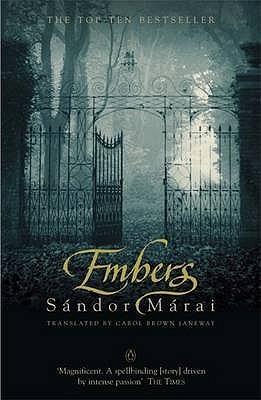Comment: Another classic under my belt. I saw this book at my local library last time I was there and since this is a short book (the Portuguese edition I read has only 153 pages) I decided I could bring and read it quickly in between my planned list for January. I didn't know anything about the plot, only that the title is well recognized, especially the translation to my language, which literally is "the candles burn until the end"... slightly more poetic than the simple "embers" in english.
his castle in the forest, always remembering the past and the strong friendship he had all through childhood and youth while studying at a private school with Konrad. However, when they were both in their early 20s something changed and after the general married his wife, the close friendship has ended. Now, 41 years after, Konrad returns to have dinner with his old friend and the general wants only to have the answer to a couple of questions...
There are many reviews by much more talented writers and thinkers than I am, who can express themselves perfectly in trying to explain the philosophical content of this book. This is not a philosophical treaty, though. What I mean to say is that the story and content can be seen through that perspective and in that case, my words wouldn't be the best to explain.
Basically, the book centers around a failed friendship although we only know for certain in the end. There are hints and it's not a surprise why Konrad and the general stopped being friends but the emotional and complex explanation of how and in what way it affected them both, the general in particular, is what makes this book special and intense.
After all, what is the meaning of friendship? What does it matter truly? And why can it leave a bitter taste if it ends on one side and not on the other? I especially liked the melancholy the general expresses in his words, not as much for why - although it hurt him of course - but mostly because he had assumed others would think like him, would respect the feeling and what it would entail.
It must be said the general's personality is obviously a continuity of the author's own state of mind. The author was growing up in a time where the Austrian-Hungary empire still existed (beginning of the 20th century), and his concept of honor, respect, duty were quite in line with the values of that period. However, not everyone thinks or feels the same and in this book it was interesting to see the elements that made Konrad and the general friends didn't last through the difficulties and differences in their characters and values. The concept of friendship acquires then, for different people, distinctive traits and allowances. I can't really explain the whole range of questions the author introduces here but I could summarize by saying that if people don't share honesty in their feelings and expectations, than can it be real friendship? Can it last through the test of time?
Time is also an interesting notion here. I found that the profound melancholy I feel towards the general, a man who has held on to his beliefs to the point of loneliness and isolation embodies all the people who feel irate in their pride and superior thinking without realizing they are missing on everything else. I too, somehow, agree with some of he general's words while talking to Konrad about what it should have meant to be a friend. The provocative aspect of his demands and questions are the true beauty of this story.
The end is very depressive and although it suits the story and the tone, it still leaves me a little sad to think people too focused on a wrong can't find joy in anything else, they are consumed by their ideas - and ideals! - and no matter how right, they can't go past it. Perhaps this wasn't the key message in this book but for me it was the notion that remained the longest, after finishing the book. While the general and Konrad have their conversation - well, more of a monologue from the general, many issues are debated, the plot is uncovered and, sadly, sadness is everlasting. Still, this is an interesting book that I have liked reading.
Grade: 8/10


No comments:
Post a Comment